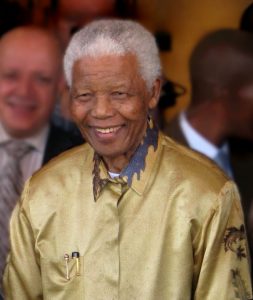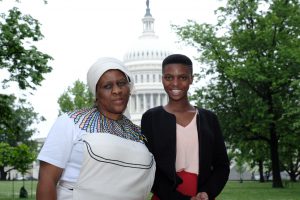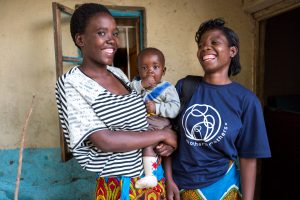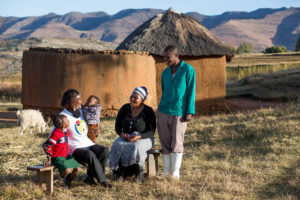Make the Impossible Possible
On World AIDS Day, m2m President and CEO Frank Beadle de Palomo reflects on the state of the HIV/AIDS epidemic and how to create a truly HIV-free generation.

Photo credit: South Africa The Good News / www.sagoodnews.co.za [CC BY 2.0 ]
Tremendous progress has been made in the fight against the HIV/AIDS epidemic. According to UNAIDS, a record number of people are on treatment, more people living with HIV are aware of their status, and the number of AIDS-related deaths is the lowest this century. Yet, despite these successes, the immensity of the challenges standing in the way of a truly HIV-free generation often seem impossible to overcome. This is certainly the case in Eastern and Southern Africa, the region most affected by the HIV/AIDS epidemic, where mothers2mothers (m2m) works with continued mission and urgency.
As an organisation born to prevent mother-to-child transmission of HIV, one of the challenges we are particularly concerned about is the toll the pandemic continues to take on children. In 2017, more than 250 children still contracted HIV each day in Eastern and Southern Africa during pregnancy, birth, and breastfeeding. One factor is a significant number of women contracting HIV during pregnancy and breastfeeding who go undiagnosed and do not receive treatment. According to UNAIDS, African women have a threefold higher risk of contracting HIV during pregnancy and birth than other HIV-negative women.
m2m has also grown into an organisation with a strong interest in adolescents and youth—since the very first children born HIV-free through our programme are now entering these vulnerable years. Here too, the numbers highlight tremendous challenges. Around 7,000 adolescent girls and young women, aged 15-24, are infected with HIV globally each week, the majority of whom live in sub-Saharan Africa. They bear the brunt of the HIV burden in the region, accounting for one in four HIV infections despite making up just 10% of the population.

Anathi Mbono (R) with her mother Babalwa earlier this year in Washington, DC.
Anathi Mbono, the 15-year-old daughter of one of m2m’s early clients and Mentor Mothers, is well aware of what makes her peers so vulnerable to HIV in her South African community: “Knowledge about HIV is still severely lacking and the difficult realities of living in townships and poor communities means that girls as young as 15 years old engage in transactional sex. They change their morals and manners to fit in, and date older men, sometimes as old as their dads, who take them to fancy places and buy them expensive things, no matter that they will have to repay them with sex. Often, they can no longer say no to unprotected sex.”
At m2m, we know that it is possible to tackle these challenges and prevent new HIV infections among these vulnerable populations. That is because every day we witness the power of the HIV-positive women we employ as frontline health workers to support women, children, and adolescents to stay healthy and thrive. Working in both health centres and in communities, these “Mentor Mothers” help HIV-positive individuals access care, start treatment, remain adherent, and live positively, while ensuring that HIV-negative clients remain uninfected. Thirty-four percent of the individuals we serve are adolescent girls and young women between the ages of 10 and 24 years.
m2m is successful in supporting women to test for HIV, access treatment, and stay in care—all critical to the Global Goal of ending AIDS by 2030. Our impact speaks for itself.

m2m Community Mentor Mother and a client in Bangwe, a town in Southern Malawi.
m2m has achieved virtual elimination of mother-to-child transmission of HIV among our enrolled clients for four year in a row, with a transmission rate of just 1.6% in 2017—far below the UN’s 5% benchmark. Ninety-nine percent of HIV-positive pregnant women and new mothers we served were initiated on treatment; and 90% are alive and remain in care after a year, which is 7% higher than the average retention rate in Eastern and Southern Africa.
Furthering our goal of stemming new HIV infections, in 2017, 91% of HIV-negative pregnant women and new mothers we served in Eswatini, Lesotho, and Uganda had at least one HIV test during their enrolment with m2m—most have had three. The impact: only 0.07% of women who were HIV-negative at enrolment into the m2m programme acquired HIV—around fifty times lower than the 2014 pan-African rate of 3.6%.

m2m Mentor Mother visiting a family in Linakeng, Lesotho.
While m2m’s Mentor Mother model is not the only innovative approach making headway against the AIDS pandemic in the communities we serve, creating a truly HIV-free generation can only be achieved at a global level. The global community has set ambitious goals to end AIDS by 2030 and create health and wellbeing for all of its citizens, no matter where they live. Yet, according to UNAIDS, there is a 20% shortfall in international funding required to keep us on track.
This World AIDS Day it is important to take inspiration from Nelson Mandela and urge leaders around the world to recommit to achieving the Global Goals. We know the challenges are not impossible to overcome. However, to make the impossible possible, we must stay focused on the ultimate prize until it is done—ending AIDS must be made possible.
What gives me and my colleagues at m2m great hope for the future is hearing from teenagers like Anathi, who is part of the generation that will soon take the reins in this global fight. Even now, she is doing her part to stop HIV/AIDS in her community, sharing what she has learned from her mother about HIV and safe sex with her friends and peers who are not as lucky to have such an engaged parent. But she too knows that is not enough: “We can’t do this alone. We also need the support of our parents, teachers, and leaders. Let’s all stand together and ensure that World AIDS Day in 30 years is a celebration of how we turned the tide of this epidemic and kept a vulnerable generation of young girls and boys HIV-free.”






















